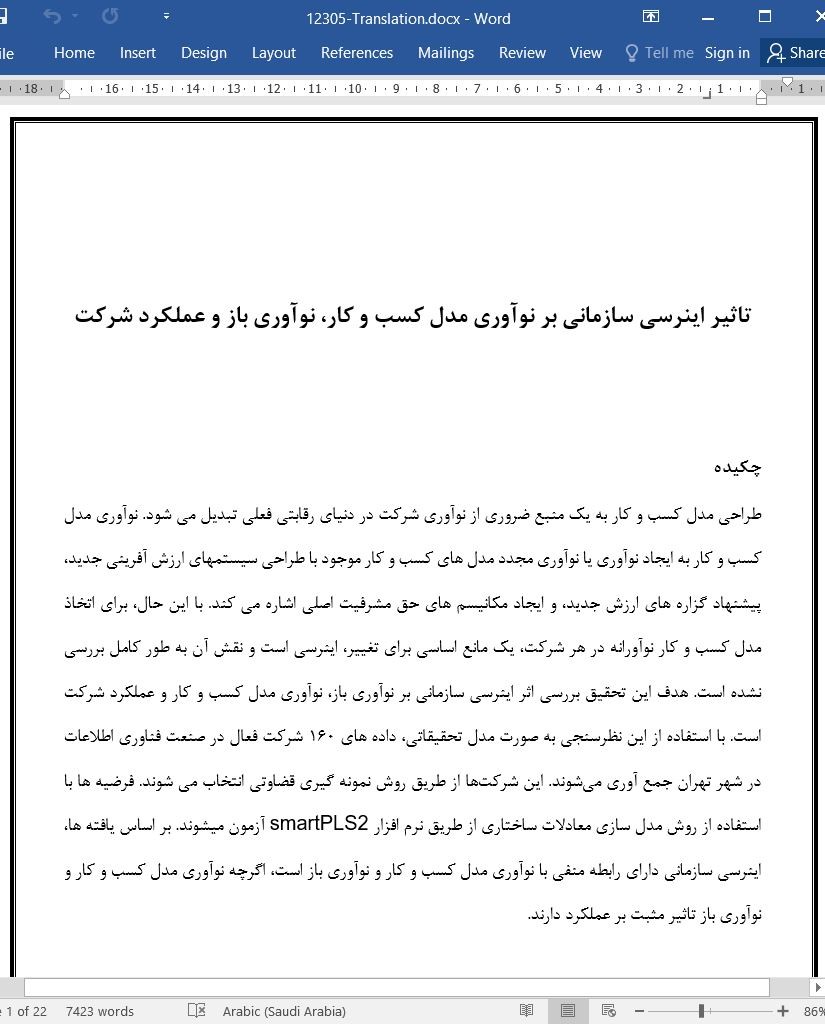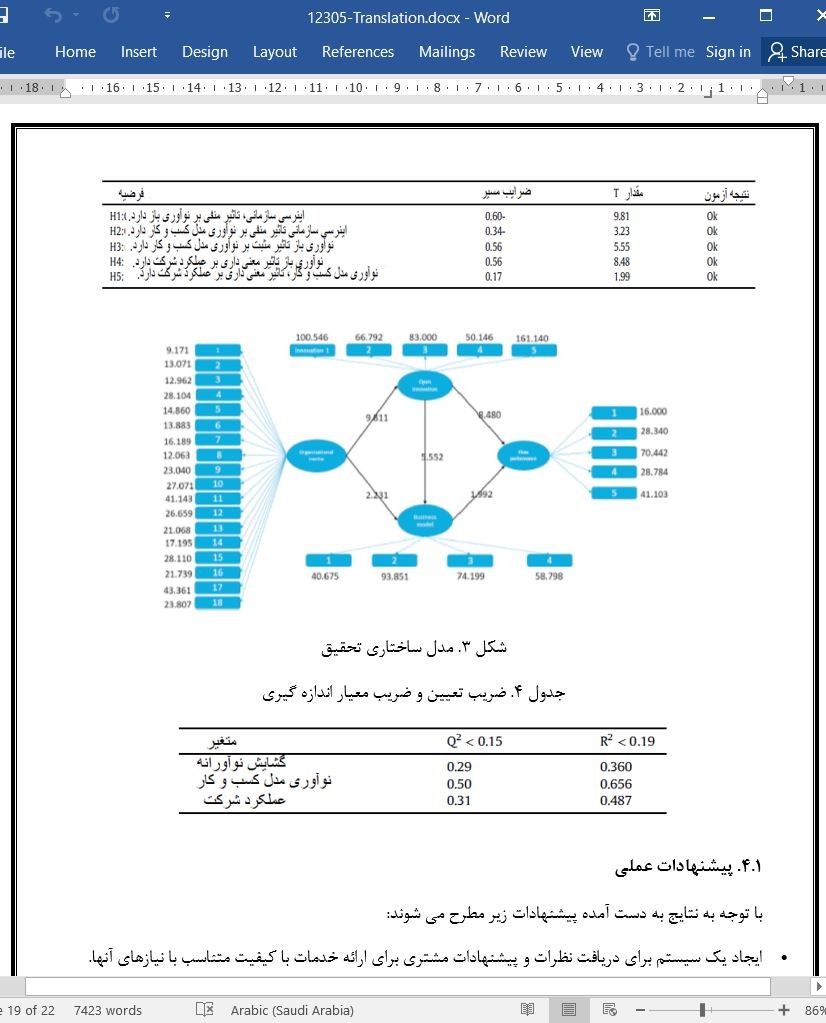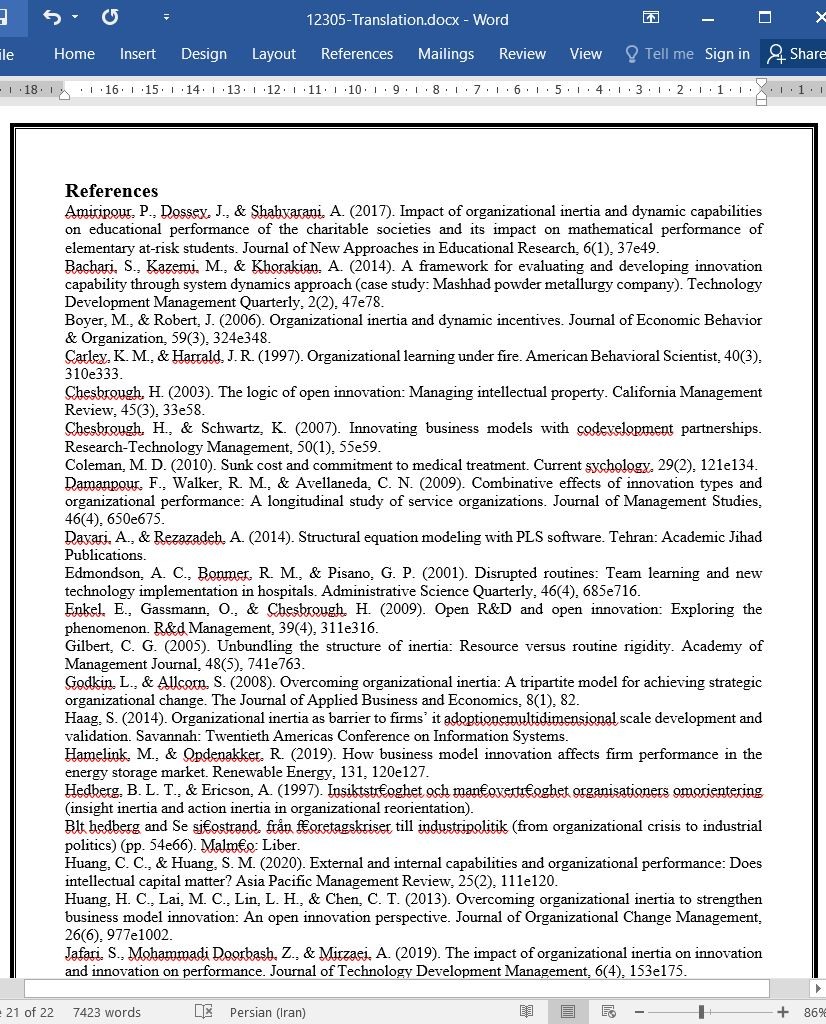
تاثیر اینرسی سازمانی بر نوآوری مدل کسب و کار، نوآوری باز و عملکرد شرکت
چکیده
طراحی مدل کسب و کار به یک منبع ضروری از نوآوری شرکت در دنیای رقابتی فعلی تبدیل می شود. نوآوری مدل کسب و کار به ایجاد نوآوری یا نوآوری مجدد مدل های کسب و کار موجود با طراحی سیستمهای ارزش آفرینی جدید، پیشنهاد گزاره های ارزش جدید، و ایجاد مکانیسم های حق مشرفیت اصلی اشاره می کند. با این حال، برای اتخاذ مدل کسب و کار نوآورانه در هر شرکت، یک مانع اساسی برای تغییر، اینرسی است و نقش آن به طور کامل بررسی نشده است. هدف این تحقیق بررسی اثر اینرسی سازمانی بر نوآوری باز، نوآوری مدل کسب و کار و عملکرد شرکت است. با استفاده از این نظرسنجی به صورت مدل تحقیقاتی، داده های ۱۶۰ شرکت فعال در صنعت فناوری اطلاعات در شهر تهران جمع آوری میشوند. این شرکتها از طریق روش نمونه گیری قضاوتی انتخاب می شوند. فرضیه ها با استفاده از روش مدل سازی معادلات ساختاری از طریق نرم افزار smartPLS2 آزمون میشوند. بر اساس یافته ها، اینرسی سازمانی دارای رابطه منفی با نوآوری مدل کسب و کار و نوآوری باز است، اگرچه نوآوری مدل کسب و کار و نوآوری باز تاثیر مثبت بر عملکرد دارند.
۱. مقدمه
امروزه، نه تنها نوآوری یک فرایند در کسب و کار نیست، بلکه مجموعهای از مولفههای جدید شامل نیازمندیهای ثبات دائمی، نیازمندیهای فرآیند تولید، تغییرات صنعتی و بازار و ترکیبی از جمعیت شناختی است (توتیفار تهرانپور و ژیا، 2014). بررسی های اخیر نشان میدهند که اهمیت نوآوری مدل کسب و کار در حال افزایش است و مدیران ارشد شرکت های جهانی پیش بینی می کنند که ضرورت آن حتی از اهمیت نوآوری در محصولات و خدمات فراتر می رود. نوآوری مدل کسب و کار یک معیار جدید است که بر اساس آن شرکتهای پیشگام سعی می کنند تا ارزش بیشتری را برای مشتریان خود ایجاد کنند و ارائه دهند. به این ترتیب، آنها تمایل دارند تا ارزش تصاحب خود را افزایش دهند.
۴.۱. پیشنهادات عملی
با توجه به نتایج به دست آمده پیشنهادات زیر مطرح می شوند:
• ایجاد یک سیستم برای دریافت نظرات و پیشنهادات مشتری برای ارائه خدمات با کیفیت متناسب با نیازهای آنها.
• تشویق به حل مسئله گروهی برای تحریک نوآوری افراد.
• استفاده از ایدههای مناسب کارکنان که سایر کارکنان را برای مشارکت در نوآوری را تشویق می کند.
• ایجاد زیرساخت های ICT برای به دست آوردن و استفاده از دانش به روز رسانی مهندسی مجدد فرایندهای سازمانی.
Abstract
Business model design becomes an essential source of firm innovation in the current competitive world. Business model innovation refers to the creation or reinvention of existing business models by designing novel value-creation systems, proposing new value propositions, and building original value-capturing mechanisms. However, to adopt the innovative business model in any organization, the inertia to change is a substantial barrier, and its role has not been examined completely. The purpose of this study is to examine the impact of organizational inertia on open innovation, business model innovation, and corporate performance. Using the survey as the research model, data were collected from 160 companies operating in the information technology industry in the city of Tehran. These firms were selected via judgment sampling method. The hypotheses were tested using structural equation modeling technique via SmartPLS2 software. Based on the findings, organizational inertia has a negative relationship with business model innovation and open innovation; though, business model innovation and open innovation have a positive effect on the performance.
1. Introduction
Nowadays, not only innovation is not a process in businesses, but also it is a set of new components containing the permanent setting requirements, production process requirements, industrial and market changes, and a combination of the cognitive population (Tootifar Tehranpour & Zia, 2014). Recent surveys demonstrate that the importance of business model innovation is undergoing an increasing trend, and the chief managers of the global corporations predict that its necessity will even surpass the importance of innovation in products and services. Business model innovation is a new criterion based on which the pioneer companies try to create and deliver more value for their customers. In this way, they tend to increase their takeover value.
4.1. Practical suggestions
Regarding the obtained results, the following suggestions are proposed:
Creating a system for getting the customers’ opinions and suggestions for providing services with a higher quality proportional to their needs.
Encouraging group problem solving for stimulating individuals’ innovation.
Applying the employees’ appropriate ideas, which encourage other employees for participation in innovation
Creating ICT infrastructures for getting and using updated knowledge of organizational processes reengineering
چکیده
۱. مقدمه
۲. پیشینه تحقیق
۲.۱. اینرسی سازمانی
2.2. اینرسی بینش
2.3. اینرسی روانی
۲.۴. اینرسی اقدام
۲.۵. اینرسی ساختاری و اینرسی اقتصادی
۲.۶. اینرسی و سایر موانع برای تغییر
۲.۷. نوآوری باز
۲.۸. نوآوری مدل کسب و کار
۲.۹. عملکرد شرکت
۳. توسعه فرضیه ها
۳.۱. اینرسی سازمانی و نوآوری باز
۳.۲. اینرسی سازمانی و نوآوری مدل کسب و کار
۳.۳. نوآوری باز و نوآوری مدل کسب و کار
۳.۴. نوآوری باز و عملکرد شرکت
۳.۵. نوآوری مدل کسب و کار و عملکرد شرکت
۳.۶. روش تحقیق
۳.۷. تحلیل داده ها
۴. بحث و نتیجه گیری
۴.۱. پیشنهادات عملی
منابع
Abstract
1. Introduction
2. Research background
2.1. Organizational inertia
2.2. Insight inertia
2.3. Psychological inertia
2.4. Action inertia
2.5. Structural inertia and economic inertia
2.6. Inertia and other barriers to change
2.7. Open innovation
2.8. Business model innovation
2.9. Company’s performance
3. Hypotheses development
3.1. Organizational inertia and open innovation
3.2. Organizational inertia and business model innovation
3.3. Open innovation and business model innovation
3.4. Open innovation and company’s performance
3.5. Business model innovation and the company’s performance
3.6. Research method
3.7. Data analysis
4. Discussion and conclusion
4.1. Practical suggestions
References
- اصل مقاله انگلیسی با فرمت ورد (word) با قابلیت ویرایش
- ترجمه فارسی مقاله با فرمت ورد (word) با قابلیت ویرایش، بدون آرم سایت ای ترجمه
- ترجمه فارسی مقاله با فرمت pdf، بدون آرم سایت ای ترجمه



